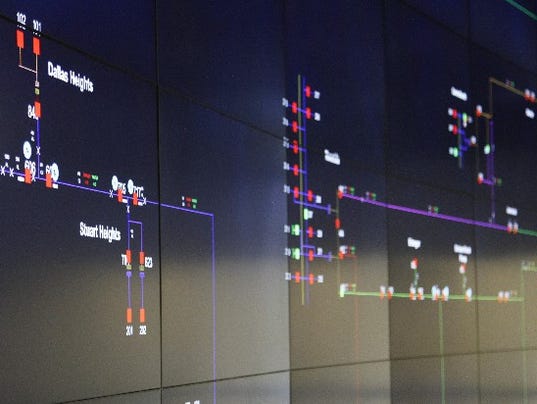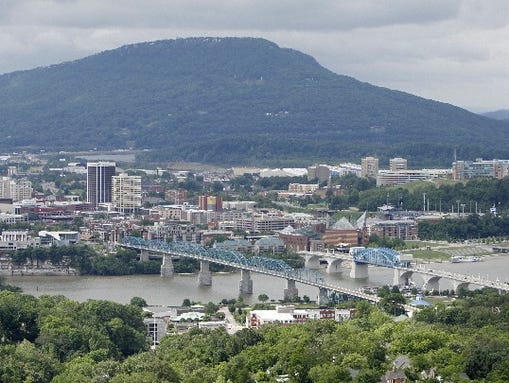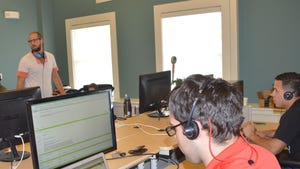Results 1 to 1 of 1
Thread Information
Users Browsing this Thread
There are currently 1 users browsing this thread. (0 members and 1 guests)
-
08-01-2014, 02:36 PM #1
FCC could overturn state bans on cities' Internet networks
FCC could overturn state bans on cities' Internet networks
USA TODAY NETWORK Jolie Lee
2:21 p.m. EDT August 1, 2014

(Photo: Chattanooga Times Free Press)
Chattanooga, Tenn., is the unlikely poster child for fast, affordable high-speed Internet.
It's the first city in the nation to offer all residents and businesses up to gigabit-per-second Internet -- about 50 times faster than what the Federal Communications Commission says is the national average.
But laws in 19 states make it very difficult or impossible for municipalities to follow in Chattanooga's footsteps and offer broadband Internet themselves, according to theInstitute for Local Self-Reliance.
Chattanooga and Wilson, N.C., petitioned the FCC last week to overrule what city officials call restrictive state laws.
Both cities want to expand their high-speed service to surrounding communities, but say the laws in their states are designed to protect incumbent Internet providers and deter cities from competing with them.
Supporters of the law say requirements ensure cities do not have an unfair advantage against private companies.
The FCC has taken the first step to respond to the requests from Chattanooga and Wilson by allowing members of the public until Aug. 29 to comment on the petitions.
It's unclear how the FCC will ultimately act, but agency head Tom Wheeler has stated publicly that the FCC has the power to preempt any state laws that restrict community broadband competition.
"Given the opportunity, we will do so," Wheeler wrote in a blog post last month.
 Downtown Chattanooga and Lookout Mountain are seen from the north side of the Tennessee River.(Photo: Dan Henry, Chattanooga Times Free Press)
Downtown Chattanooga and Lookout Mountain are seen from the north side of the Tennessee River.(Photo: Dan Henry, Chattanooga Times Free Press)
What these laws say
In Chattanooga, the Electric Power Board installed 8,000 miles of fiber-optic cables to every home and business in a 600-square-mile area.
The gigabit service launched in 2009, and became available to all 170,000 residents in 2011, said Donna Bailey, EPB spokeswoman.
Bailey compares high-speed Internet access to electricity access a century ago.
"We believe it's this century's critical infrastructure," she said.
Chattanooga has received hundreds of requests from residents in surrounding communities to expand Chattanooga's Internet service into their area, Bailey said.
But Tennessee law prevents Chattanooga from offering Internet outside of its electricity coverage area.
The laws in the 19 states vary in language. Some set outright bans, while others create so many barriers that cities are discouraged from even trying, said Jim Baller, a lawyer representing cities across the country and co-founder of the Coalition for Local Internet Choice.
North Carolina's 2011 law does not explicitly ban cities from building out broadband service, but it lays out so many requirements for cities to meet that it is effectively a ban, said Catharine Rice, president of the SouthEast Association of Telecommunications Officers and Advisors.
For example, a city must do a house-by-house census to figure out a community's Internet speed, something that no municipality could afford, she said.
"It's like death by a thousand cuts," Rice said.
Wilson began providing fiber-to-the-home Internet in 2008 and launched gigabit service in 2013. The city is able to continue offering Internet because it was grandfathered into the state law, said Will Aycock, operations managers of the city's broadband network.
If the law had been in place before 2008, Aycock said, "We could not provide the services we are providing today."
Support for the laws
A lawyer for North Carolina's telecom association says the law is needed to stop cities from trying to shift costs to competitors, such as raising fees for rights-of-way use.
"One of the concerns addressed by the law is the dual roles of cities as competitors and regulators," said Marcus Trathen, a lawyer representing the North Carolina Cable and Telecommunications Association, in an e-mail to USA TODAY Network.
The National Conference of State Legislatures has also voiced objections on the principle of federalism.
James Ward, NCSL's director for state-federal relations, said the organization plans to submit comments to the FCC about the Chattanooga and Wilson petitions.
In a letter this month to the FCC, the organization said it would "challenge the constitutionality" of any FCC action that impacts state laws.
http://www.usatoday.com/story/news/n...ssee/13322543/
NO AMNESTY
Don't reward the criminal actions of millions of illegal aliens by giving them citizenship.
Sign in and post comments here.
Please support our fight against illegal immigration by joining ALIPAC's email alerts here https://eepurl.com/cktGTn
Similar Threads
-
Dems Want Networks To Manipulate Climate Coverage Like BBC - Pravda USA Networks
By AirborneSapper7 in forum Other Topics News and IssuesReplies: 0Last Post: 01-16-2014, 02:28 AM -
U.S. cities become hubs for Mexican drug cartels’ distribution networks
By JohnDoe2 in forum illegal immigration News Stories & ReportsReplies: 0Last Post: 11-04-2012, 12:15 PM -
ME: LePage Absolutely Right to Overturn 'Sanctuary State' po
By American-ized in forum illegal immigration News Stories & ReportsReplies: 0Last Post: 01-20-2011, 09:42 PM -
Mexican lawmakers visit Arizona in effort to overturn state
By SOSADFORUS in forum General DiscussionReplies: 4Last Post: 05-26-2010, 12:01 PM -
OREGON STATE POLICE BANS WAR PROTEST
By minnie in forum Other Topics News and IssuesReplies: 2Last Post: 12-13-2006, 03:12 AM


 LinkBack URL
LinkBack URL About LinkBacks
About LinkBacks





 Reply With Quote
Reply With Quote


Durbin pushes voting rights for illegal aliens without public...
04-25-2024, 09:10 PM in Non-Citizen & illegal migrant voters